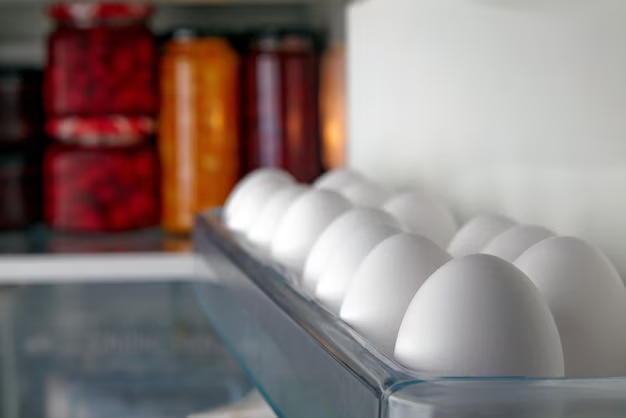Discover the Shelf Life of Organic Eggs: How Long Do They Last in the Fridge?
When you reach into your refrigerator looking for eggs, you might pause and wonder just how long they've been sitting there. If you're mindful about choosing organic eggs, it's not only the nutritional quality or ethical considerations on your mind but also the question of their shelf life. Whether you're planning a lavish brunch or whipping up a quick breakfast, knowing the longevity of your eggs could save you from a culinary mishap. Let’s dive into the details of properly storing organic eggs, so you can confidently cook with freshness.
🥚 The Basics of Egg Longevity
Eggs are a kitchen staple and, fortunately, when stored correctly, have an impressive lifespan. When it comes to organic eggs, the rules aren't vastly different from conventional eggs, though how they’re handled can add a slight twist. Here’s what you need to know:
- Organic vs. Regular Eggs: Organic eggs come from hens that are fed an organic diet and not treated with antibiotics. The primary distinction is found in their production rather than dramatic differences in shelf life.
- Refrigeration is Key: Storing eggs in the fridge prolongs their shelf life significantly compared to keeping them at room temperature.
🧊 Understanding Egg Refrigeration
Proper refrigeration is pivotal to making sure your eggs last long enough for you to enjoy them at their best. Here’s how to maximize their shelf life:
Storing Conditions
- Temperature Matters: Aim for a consistent refrigerator temperature, ideally below 40°F (4°C). This keeps bacterial growth at bay.
- Placement: The inside of the fridge is more stable than the door, where temperatures fluctuate more, which can harm egg longevity.
Storage Practices
- Carton Storage: Keep eggs in their original carton. It protects them from absorbing strong odors and helps maintain a steady temperature.
- Upside Down: Place eggs with the pointed end down. This minimizes the exposure of the yolk to air and extends freshness.
🕓 How Long Do Organic Eggs Last?
Freshness Timeline: If you store your organic eggs properly in the fridge, they can last between 3 to 5 weeks.
The condition of the egg will affect how long it will last:
- Fresh Eggs: When first placed in the fridge, organic eggs possess the best flavor and texture.
- Older Eggs: Though still safe to consume, eggs a few weeks old work better for baking rather than frying or poaching.
🔍 Testing Egg Freshness
Not sure if your eggs are still good? These simple tests can help determine freshness:
The Float Test
- Fill a Bowl with Water: Place the egg in water; if it sinks and lays flat on its side, it's fresh. Standing upright means it's older but still consumable, while floating suggests it should be discarded.
The Shake Test
- Gentle Shake: Hold the egg up to your ear and give it a gentle shake. A muffled sound indicates freshness, while sloshing suggests aging.
💡 Practical Tips for Egg Usage
Once you've determined that your eggs are still good for consumption, a few practical tips can help you use them wisely:
- Rotation System: Always place the newest eggs behind older ones to use the older ones first.
- Labeling: Keep track of the purchase date by writing it on the carton, ensuring you use them within a reasonable time.
- Cooking Techniques: Older eggs are perfect for boiled dishes, as they peel easier; fresher eggs are your go-to for poached recipes, where structure is key.
🗒️ Quick Reference: Organic Egg Storage Tips
Here’s a handy guide to ensure you’re always making the most of your organic egg stash:
| Tip | Description |
|---|---|
| 🥶 Keep Cool | Store eggs in the fridge below 40°F (4°C). |
| 📍 Inside Shelf | Store eggs in the main body of the fridge. |
| 📅 Date Awareness | Note the date of purchase on the carton. |
| ✅ Fresh Check | Use the Float Test to check for freshness. |
| ⏳ Use Older Eggs | For baking or boiling, prefer older eggs; save fresh ones for poaching or sunny side up. |
🥙 The Nutritional Angle
Organic eggs are cherished not just for their presumed ethical benefits but also for their nutritional profile. They are a great source of high-quality protein, B vitamins, and essential fatty acids. Ensuring that your eggs are fresh can help maximize these nutritional benefits as well, supporting family meals that are both tasty and health-conscious.
🚫 Common Missteps to Avoid
While storing eggs may feel straightforward, there are common errors that can impact their longevity:
- Room Temperature: Avoid leaving eggs out for extended periods, which can expedite spoilage.
- Cross-Contamination: Always handle eggs with clean hands and utensils to avoid introducing bacteria.
- Ignoring Odor: If an egg smells off after cracking, it’s best to discard it. It’s better to err on the side of caution.
🤔 Final Reflection
By integrating these practices, you can ensure your eggs are always ready for your next culinary creation. Reassuringly, organic eggs follow similar shelf-life rules to their conventional counterparts, meaning you don’t have to navigate a whole new set of principles. Whether scrambled, boiled, or whipped into a decadent dessert, knowing your eggs' optimal storage practices can make a world of difference.
Unlock the potential of your kitchen routines by treating your organic eggs with the care they deserve. Wielding this knowledge ensures that your meals are scrumptious and safe, underscoring meals with peace of mind and culinary confidence.
Now that your questions about "How Long Do Organic Eggs Last In The Refrigerator?" have been answered, go forth and cook with the assurance of a well-stocked and efficiently anticipated egg supply. Bon appétit! 🍳

